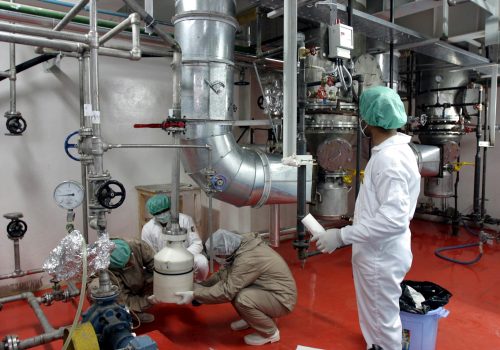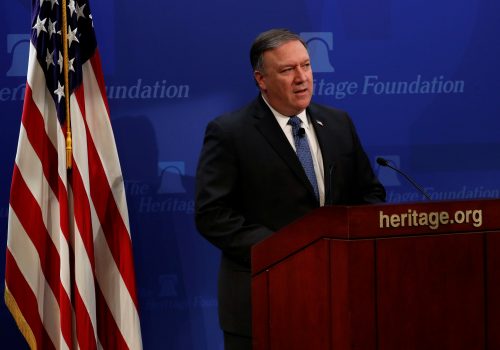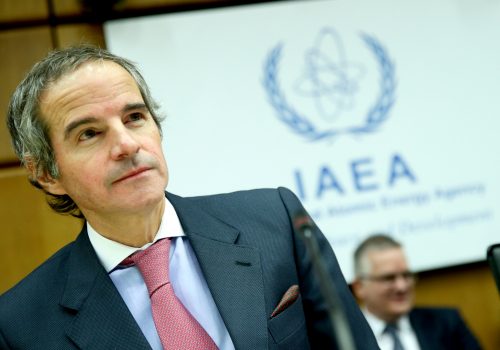A Biden presidency is bad news for Netanyahu, but not necessarily for Israel’s national security
In the past few months, Prime Minister Benjamin Netanyahu’s Iran front has been unusually quiet. There has not been the regular warning that an Iranian bomb is imminent.
The apparent reason for this is the coronavirus pandemic and the political constitutional crisis Israel finds itself in due to the prime minister’s judicial imbroglio. But Netanyahu ensured that US Secretary of State Mike Pompeo would not let up on the Iran issue and would continue with the “maximum pressure” policy, which is intended to dismantle the Joint Comprehensive Plan of Action (JCPOA). This is after all, the common goal of Netanyahu and the Trump administration.
From a pure national security perspective, however, a US return to the 2015 Iran nuclear agreement would be an important contribution to Israel’s national security. The JCPOA prevents a new nuclear state in the Middle East and reduces additional countries’ intentions to join the nuclear club—thus, blocking a regional nuclear race.
Indeed, Pompeo did not disappoint. Every few weeks, the State Department has turned up the pressure, issuing new sanctions on Iranian individuals, entities, and corporations. The US blocked Iran’s request for a $5 billion emergency loan from the International Monetary Fund to combat COVID-19. The US also turned down the European Union’s request to temporarily ease US sanctions in order for European banks—who fear secondary sanctions—to help Iran purchase medicine and medical equipment needed to fight the coronavirus epidemic, which has officially infected over a hundred thousand Iranians and killed more than seven thousand.
But something new happened in April. Joe Biden, former vice president under the Barack Obama administration, became the presumptive Democratic nominee, gaining not just the endorsement of presidential candidate Senator Bernie Sanders, but former President Obama as well.
If Biden is elected president in November, Israel and the new US administration will very likely find themselves on a collision course—assuming that Netanyahu will still be prime minister. Biden, if elected president, can be expected to represent a quantum change from the Trump administration’s Iran policy that Netanyahu vehemently supports. Similarly, there will be a return to the commitment of American leadership and deep involvement in global diplomacy. It will no longer be the isolationist “America First,” but a return to multilateralism. It will, especially, no longer be the Trump policy of withdrawing from international agreements such as the JCPOA.
One can safely assume that criticism will be particularly strong in one of the issues that is critical to Netanyahu’s worldview: the nuclear agreement with Iran. Candidate Biden presented his clear position on the nuclear issue in a detailed New York Times question and answer session on foreign policy—which did not garner much attention in Israel—explaining that Tehran must return to and comply fully with its JCPOA obligations. If Iran does this, Biden said, the US would re-enter the agreement and remove unilateral sanctions imposed by the Trump administration. Biden emphasized that he would work together with his European allies—Germany, France and the United Kingdom, who are signatories and steadfastly refused Trump’s demands to withdraw from the JCPOA—“to strengthen and extend it.”
This is the complete opposite of Netanyahu’s views that a preventive strike on Iranian nuclear sites is one of the solutions and, perhaps, the option he might prefer. It’s worth noting that Netanyahu chose a memorial ceremony on October 2019, marking the anniversary of the 1973 Yom Kippur War, to make his case for the option of a preventive strike on Iran.
Biden’s starting point is that it is possible to return to JCPOA. Iran’s deviations and violations over the past year can be reversed and corrected, which Tehran repeatedly said it is willing to do, if the US returns to the nuclear agreement. Furthermore, Iran has not returned to the 20 percent enrichment level that is liable to lead to a “fast track” to military-level enrichment necessary for a bomb. This was the focus of the cartoon that Netanyahu presented at the 2012 UN General Assembly.
The Biden approach of strengthening and extending the original agreement is a pivotal one in the JCPOA debate. The reference is, apparently, to the “Sunset Clause” in which the essential elements of the JCPOA expire. Firstly, the main stages of the Sunset Clause have not been reached—the limitations on the amount of uranium Iran can enrich expires in 2031. As a result, there is needed time for diplomacy. Secondly, the Sunset Clause articles are not unique to the JCPOA and are recognized as part of nuclear arms control accords. Towards the end of such agreements, the parties usually discuss the extension of the target dates.
In effect, Iran has refrained from accelerating its nuclear program—not even under the cover of the COVID-19 crisis—and continues to uphold the tight and continuous 24-hour IAEA monitoring, in accordance with the European requirement that is an essential requisite for a return to the original agreement and the removal of sanctions.
The anticipated collision course described above would, therefore, be, not between Iran and the US, but between Netanyahu and a potential Biden presidency. It is therefore incumbent on Israel to develop a professional channel of communication with Biden’s strategic team—in particular, with Colin Kahl, who was Biden’s national security advisor during the Obama administration—through professional contacts in the Israeli Military Intelligence Branch and the Israel Atomic Energy Commission.
In the Israeli system, the IDF Military Intelligence Branch is the agency responsible for the annual National Intelligence Assessment. It tends not to adopt the alarmist approach favored by Netanyahu regarding the Iranian nuclear program and his goal of cancelling the Iran deal. It is, therefore, desirable that these two agencies would be the ones to lead the channel of communications with the Biden team, rather than Yossi Cohen—the head of the Mossad—and the Israeli Ambassador to the US—Ron Dermer—who are ideologically and closely tied with Netanyahu and with conservative circles in the US opposed to the nuclear agreement.
The possibility of a Biden presidency might have a significant impact on Israel. On the one hand, it could be a positive contribution to Israel’s national security as a result of the return of the US to the JCPOA. On the other hand, it could set Israel and the US on a collision course as a result of Netanyahu placing all his bets on a Trump re-election.
Shemuel Meir is a strategic blogger for Haaretz focusing mainly on nuclear issues, Iran, and a Middle East Nuclear Free Zone. He is a former IDF analyst and Tel Aviv University researcher. Follow him on Twitter: @ShemuelMeir.
Image: U.S. Vice President Joe Biden sits with Israel's Prime Minister Benjamin Netanyahu (R) before a dinner at the Prime Minister's residence in Jerusalem March 9, 2010. Biden assured Israel on Tuesday of Washington's commitment to its security and preventing Iran from producing nuclear weapons. REUTERS/Baz Ratner


